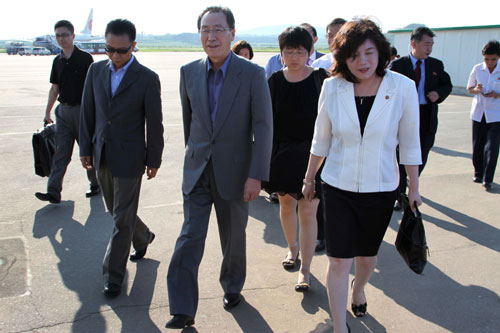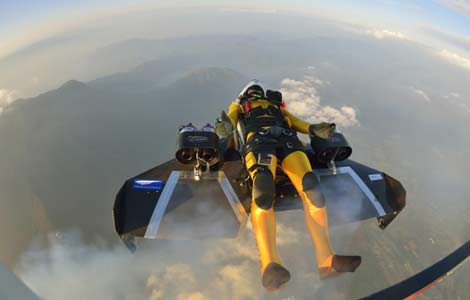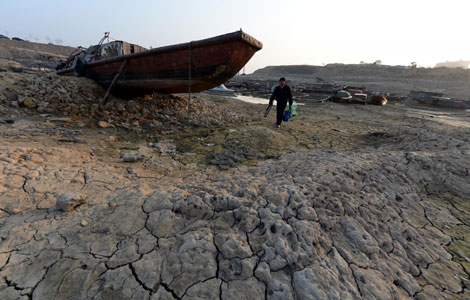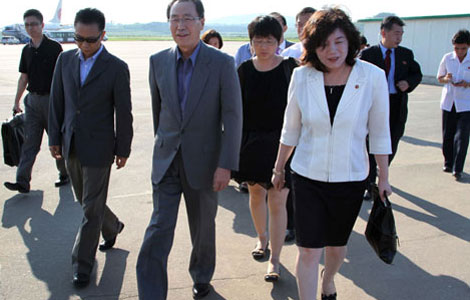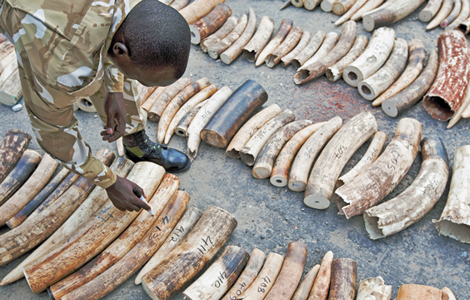Nuclear envoy seeks peaceful path forward on peninsula
Updated: 2013-11-07 07:25
By Zhou Wa (China Daily)
|
||||||||
|
|
China's top nuclear envoy continued his shuttle diplomacy on Wednesday with a trip to Pyongyang in the hopes of narrowing the differences among countries for an early resumption of the suspended Six-Party Talks.
Analysts said that Beijing played a more positive role in resuming the nuclear negotiations and that all parties are trying to better understand each other through frequent exchanges.
But the resumption can hardly come about until all parties figure out ways to prevent the negotiations from being set back by nuclear tests and rocket launches conducted by Pyongyang, they added.
It is a second visit by Wu Dawei, China's special representative for affairs on the Korean Peninsula, to Pyongyang since August. He also discussed the nuclear issue with DPRK First Vice-Foreign Minister Kim Kye-gwan in Beijing in September.
Wu returned from a visit to Washington last week, during which he exchanged ideas on Pyongyang's nuclear issue with his US counterparts.
Seoul-based MBC television station said Wu's immediate visit to Pyongyang after returning from Washington was aimed at passing on the results of his talks with his US counterpart and pushing for the resumption of the Six-Party Talks.
"Through a series of high-level consultations with the US and the Republic of Korea, China seems to better understand its position on the DPRK issue and is eager to push for every party involved to narrow their differences for an early resumption," said Wang Junsheng, a researcher on East Asian studies with the Chinese Academy of Social Sciences.
Coinciding with Wu's shuttle diplomacy, other parties involved in the Six-Party Talks are also engaging in exchanges on the nuclear issue.
On Monday, ROK top nuclear negotiator Cho Tae-yong led a delegation to Washington. During his five-day stay, Cho was scheduled to meet with his US counterpart Glyn Davies and other senior US officials, Arirang News in Seoul reported.
With Cho's Washington visit, discussions on resumption of the stalled denuclearization talks seem to be speeding up. Trilateral talks between the nuclear envoys of the ROK, the US and Japan are also scheduled for Wednesday in Washington. The talks are also fueling such hopes, said the report.
Yonhap News Agency said that the frequent communication about the Six-Party Talks is a sign that the talks may resume.
Meanwhile, US Vice-President Joe Biden will kick off his trip to China, Japan and the ROK later in November.
"But the differences between Pyongyang and Washington as well as its allies including Seoul are still hard to bridge," said Wang.
In August, Pyongyang expressed its willingness to resume the Six-Party Talks during a meeting between Kim Yong-nam, president of the Presidium of the Supreme People's Assembly, and former US president Jimmy Carter.
While the DPRK called for the reopening of talks without any conditions, the US and the ROK have demanded Pyongyang take steps to prove it is serious about denuclearization.
It will be difficult for the talks to resume until Pyongyang takes action to make other parties believe that the resumption will not result in a new round of nuclear tests and missile launches, said Zhu Feng, a professor on global affairs at Peking University.
"Violating its previous guarantees, Pyongyang has run out of trust from other countries in the Six-Party Talks. It cannot be accepted that Pyongyang will abandon its guarantees again when the talks are resumed," he said.
In a joint statement in 2005, the DPRK promised to abandon its nuclear weapons and existing nuclear programs. But Pyongyang conducted its third nuclear test in February, after launching a rocket in December.
At a news conference on Tuesday, Foreign Ministry spokesman Hong Lei urged all sides to return to their positions in the 2005 joint statement.
All parties should set a suitable threshold for direct dialogues and put the addressing of the issue on a track that is sustainable, irreversible and conducive to trust-building, said the spokesperson.
Despite the difficulties, Wang still holds a positive attitude toward the resumption of the talks.
"All parties understand that the talks offer a practical channel for communication on the nuclear issue on the Korean Peninsula. The situation on the peninsula may become worse without this mechanism," he added.
zhouwa@chinadaily.com.cn
Most Viewed
Editor's Picks

|

|

|

|

|

|
Today's Top News
Possible evidence of Arafat poisoning
Sex education cartoon an instant online hit
U. Michigan gets grant for China center
China's increasing role in global nuclear power
Panda cub drawing votes for her name
Firm breaks ground for new Suzhou facility
Program improves bone health in elderly Asians
World to see boom in big firms
US Weekly

|

|
